
*Gyza is a variant of Stop/DJVU. Source of claim SH can remove it.
The Gyza File
The Gyza file is a dangerous threat that belongs to the Ransomware category. Cybercriminals often send phishing emails with infected attachments in order to distribute this malware to as many computers as possible. These emails might appear legitimate, mimicking trusted organizations or people, but if you open the attachments, the ransomware can infiltrate your system. Downloading files, software, or media from untrustworthy websites or torrents can also lead to a Gyza file infection. This is because the malware operators can hide it in seemingly harmless downloads. Visiting compromised websites or clicking on malicious online ads that often redirect users to random websites can also trigger ransomware downloads, as well as outdated or unpatched software on your computer, that can provide entry points.
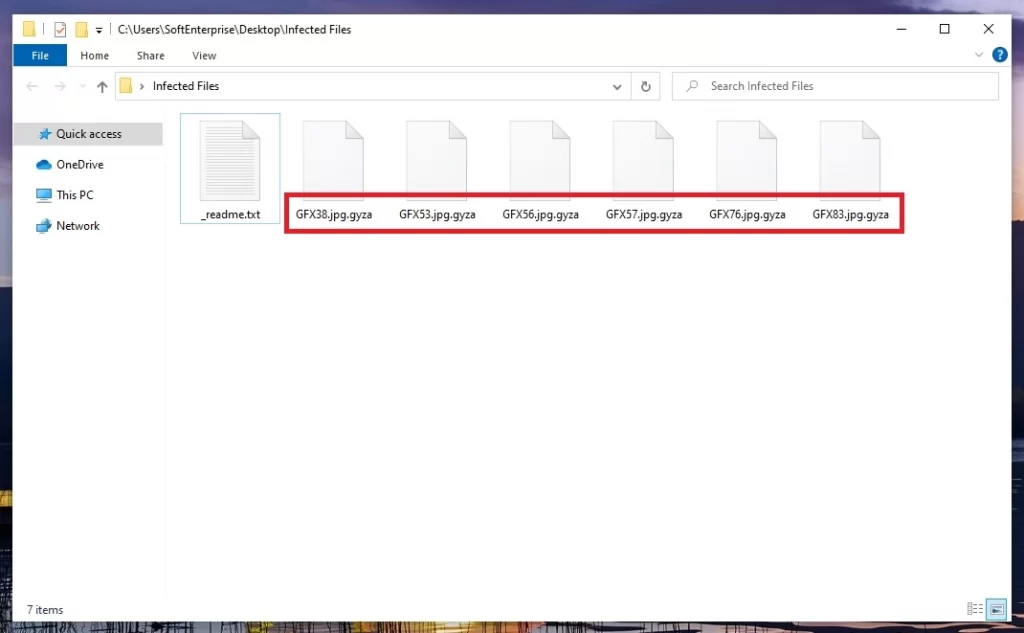
How to decrypt Gyza ransomware files?
Decrypting files that Gyza ransomware has locked up can be quite a challenge since it depends on various factors. Different ransomware types use different secret codes to seal your files, and some codes are incredibly tough to crack. Occasionally, experts working against cybercrime develop tools to help you unlock these files, acting like digital locksmiths. However, there’s no guarantee these tools will work every time, so paying the ransom may seem like an easy way out, but it’s risky. You might not get your files back, and it encourages cybercriminals to continue their unlawful activities. To steer clear of such troubles, it’s much wiser to proactively protect your data from ransomware. Regularly back up your important files, keep all your software up-to-date, and exercise caution when clicking online to avoid falling into this kind of digital trap.
How to remove Gyza ransomware virus and restore the files?
Removing the Gyza ransomware can be done using specialized computer programs or by seeking assistance from cybersecurity experts. However, even after the malicious software is eradicated, your files remain locked, and paying the ransom becomes a doubtful solution. Therefore, in the event of an encounter with this malware, it’s advisable to consult with cyber experts for guidance, although it’s crucial to prepare for the possibility of never regaining access to your files.
The Gyza virus
There are several signs that your computer might be infected with the Gyza virus. The most obvious one is when you suddenly can’t open your files. If you see unfamiliar file extensions tacked onto your documents, like .Gyza, that’s a strong indicator of ransomware at work. It’s as if your files have been padlocked, and these extensions are the keys only the cybercriminals possess. After the attack, the Gyza virus typically leaves a “ransom note” for its victims, which contains a message from the ransomware operators. You might find it in the form of a pop-up on your screen demanding payment to unlock your files, or a file that is located in the folder of your encrypted files. The ransom message is pretty hard to ignore and can be a clear sign you’re dealing with ransomware.
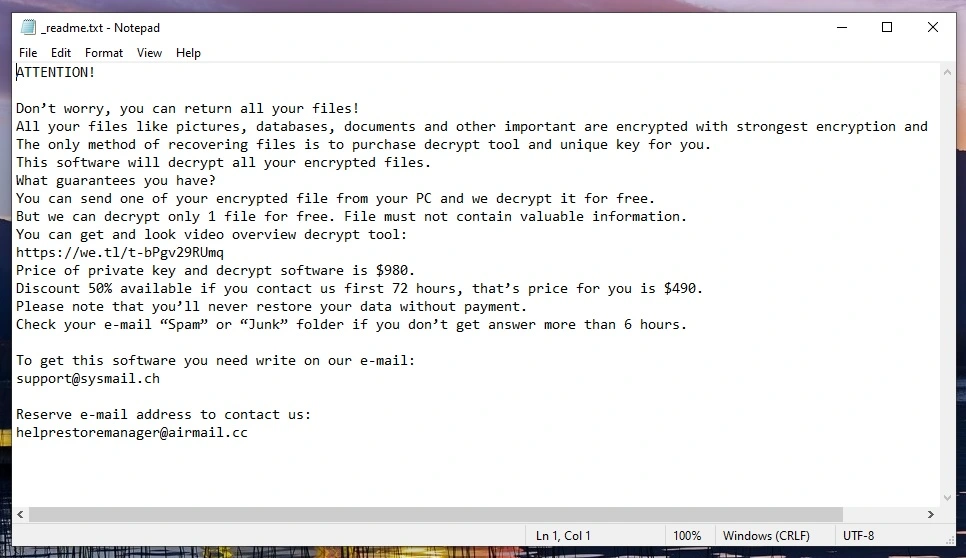
Gyza
The Gyza ransomware can eat up your computer’s resources, causing it to slow down. If your once-speedy PC starts feeling like it’s wading through molasses, it’s worth investigating. If you notice files disappearing or looking different than they used to, that’s another sign. Aside from that, the Gyza ransomware might try to communicate with its command and control servers. So, if you see unusual network traffic when you’re not actively using the internet, it could be the ransomware at play. Some ransomware strains are crafty enough to disable your antivirus or anti-malware programs to avoid detection. If you find your security software isn’t working, that’s a cause for concern. In case you have noticed any of these signs, don’t panic but disconnect from the internet, and seek professional help to assess the situation.
.Gyza
Decrypting the .Gyza files isn’t a one-size-fits-all solution. Different strains of ransomware use various encryption methods, some stronger than others, therefore, it is important to correctly identify the ransomware that you are dealing with. In some lucky cases, cybersecurity experts or law enforcement agencies may develop decryption tools for specific types of ransomware, such as .Gyza, Eqza, Iicc. These tools can help victims regain access to their files without paying a ransom. But not all ransomware variants have decryption solutions available, so make sure you do your online research carefully and check out the decryption solution in our removal guide below.
Gyza Extension
The effectiveness of decryption of the Gyza extension also hinges on the strength of the encryption used by the ransomware. Some ransomware creators employ sophisticated encryption algorithms that are incredibly tough to crack. This means that even with the best efforts, decryption may be impossible for certain files if the encryption is exceptionally strong. Besides, even if decryption tools exist, there’s no guarantee they will work for every victim. Your ability to decrypt the Gyza extension files depends on factors like the specific ransomware variant, the strength of the encryption, and whether decryption tools are available. It’s a bit like trying to unlock a secure safe; sometimes, you have the right combination, and sometimes you don’t.
Gyza Ransomware
Paying the ransom demanded by the cybercriminals behind the Gyza Ransomware is risky and discouraged. While it might seem like the quickest solution, there’s no assurance that paying will result in file recovery. It’s essentially a gamble, and it encourages cybercriminals to continue their illegal activities. Therefore, instead of relying on decryption as a solution, it’s wiser to focus on prevention. Regularly backing up your data, keeping your software up-to-date, and practicing safe online behavior can help you avoid falling victim to the Gyza ransomware in the first place as prevention is often more effective and less stressful than dealing with an infection.
What is Gyza File?
Ransomware like Gyza is like a digital burglar, and it’s after one thing – your valuable data. It usually goes after common file types. These include documents like Word or PDF files, images, videos, spreadsheets, and even databases. Essentially, anything that holds personal, work-related, or sensitive information is on its radar and can become a Gyza file – an encrypted version of the same file. The cybercriminals target these files because it ensures a wider impact. If they encrypt your vacation photos and turn them into Gyza files, you might not pay to get them back. But if it’s your work files or cherished family memories, you’re more likely to consider paying the ransom, which is what they want.
SUMMARY:
*Gyza is a variant of Stop/DJVU. Source of claim SH can remove it.
Gyza Ransomware Removal

If you’ve been infected with Gyza, the first thing you should do is bookmark this webpage with removal instructions, so you can have quick access to it. Next, the infected machine should best be rebooted in Safe Mode, as explained in this link. Once you’ve done these preparations, you can safely proceed to the instructions below to remove the traces of Gyza from your computer.

WARNING! READ CAREFULLY BEFORE PROCEEDING!
*Gyza is a variant of Stop/DJVU. Source of claim SH can remove it.
The next step is to look for any processes associated with the ransomware in the Processes tab of the Task Manager. You open the Task Manager, press CTRL + SHIFT + ESC keyboard keys together, then select the second tab from the top. Look at how much CPU or memory the processes consume, or look at their names to identify any suspicious-looking ones.
When you isolate a suspicious process and right-click on it, you can select Open File Location, and check its files for malicious code.
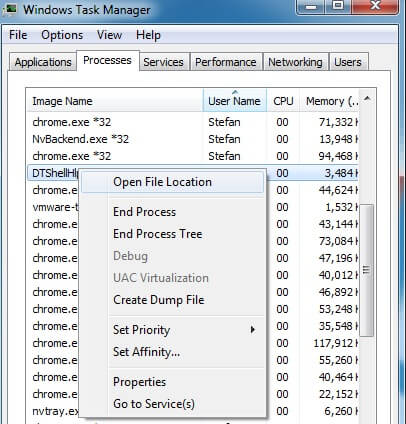
To be on the safe side, these files need to be scanned with an antivirus program. Those without access to a reputable anti-virus program can use the free online virus scanner provided below:

If the scan results show that there is a danger, right-click on the process that is associated with the infected files and select End Process. The File Location folder must be cleared of all dangerous files before moving on.

In the third step, we will explain to you how to look for any alterations to your system’s Hosts file that can indicate a possible hacking. To do that, hold down the Windows key and R at the same time, then copy/paste the line below in the Run window that pops on the screen and press Enter:
notepad %windir%/system32/Drivers/etc/hosts
In the text of the file, look for anything strange under Localhost, such as Virus Creator IPs like those on the example image below:
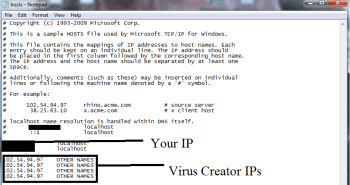
If you come across such IPs under “Localhost,” please leave us a comment below this post. They’ll be checked by a member of our team, who will tell you what to do if anything suspicious is found.
As long as there are no unauthorized modifications in your Hosts file, you don’t need to do anything. Just close the Hosts file and return to the Windows Search field.
Type msconfig in the search and press Enter:
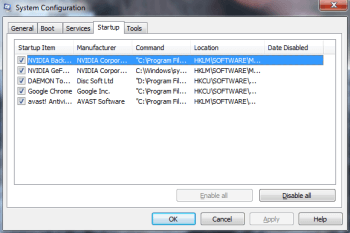
Select “Startup” from the tabs at the top, and be sure to do some online research on any startup items with “unknown” manufacturer or random names that you find in the list. If you find enough information that a specific startup item is dangerous and is connected to Gyza, you can disable it by unchecking its respective box and clicking OK.

*Gyza is a variant of Stop/DJVU. Source of claim SH can remove it.
Once it has gained access to the system, a ransomware like Gyza has the potential to add malicious entries to the registry. What is more, it is possible that the malware could resurface if these registry entries aren’t removed. Therefore, you’ll need to go through your registry and carefully search it in order to completely remove Gyza.
Attention! There is a risk of system corruption when important registry files and apps are modified or deleted. For this reason, ransomware victims are advised to remove potentially hazardous files from critical system locations like the registry only with the help of specialized malware removal tools.
If you want to proceed with the manual removal of Gyza anyway, please open the Registry Editor and check for Gyza-related entries that need to be removed.
To do that, type regedit in the Windows search field and hit Enter. When the Registry Editor starts, press CTRL and F from the keyboard to access the Editor’s Find window. In it, type the ransomware’s name and start a search. If there are files with that name in the search results, they need to be carefully deleted.
Using the Windows Search field, run a new manual search for Gyza-related files in each of the five locations listed below:
- %AppData%
- %LocalAppData%
- %ProgramData%
- %WinDir%
- %Temp%
If there are no suspicious files or subfolders, you should not make any changes. However, if there are, you should get rid of them. To remove the ransomware’s temporary files, just delete everything in the Temp directory.

How to Decrypt Gyza files
The decryption method for your encrypted data may be different depending on the type of ransomware that has attacked you. The file extension added to the encrypted files can help you identify which Ransomware variant has attacked you.
New Djvu Ransomware
STOP Djvu Ransomware is the most recent version of the Djvu Ransomware. The .Gyza file suffix tell this new version apart from other variants of the ransomware. The good news is that files encrypted with an offline key can currently be decrypted. You can download a decryption software by clicking on the following link:
https://www.emsisoft.com/ransomware-decryption-tools/stop-djvu
Decryption
To start the decryption tool, select “Run as Administrator” and then click Yes. Before proceeding, please read the license agreement and the on-screen instructions carefully. Simply click on the Decrypt icon and follow the on-screen instructions to decrypt your data. It is important to keep in mind that this tool cannot decrypt data that has been encrypted with unknown offline keys or online encryption.
Attention! Remove all files associated with ransomware before attempting to decrypt any files. An anti-virus program like the one on this page and a free online virus scanner can be used to remove infections like Gyza and other malware from the system.

Leave a Reply